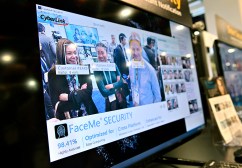Facial recognition technology needs federal regulation, Microsoft says

Citing concerns about privacy and civil liberties, Microsoft’s president has taken the unusual step of recommending federal regulations for facial recognition technology.
In a blog post published last week, company President Brad Smith wrote to express the company’s support for “proactive” congressional oversight of the emerging technology, instead of leaving the industry to police itself. Most other companies that make facial recognition software have largely remained mum on the subject of privacy. Some, like Amazon, have defended the biometric tech by citing its benefits.
“Facial recognition technology raises issues that go to the heart of fundamental human rights protections like privacy and freedom of expression,” Smith wrote. “These issues heighten responsibility for tech companies that create these products. In our view, they also call for thoughtful government regulation and for the development of norms around acceptable uses.”
Smith acknowledges that facial recognition technology has some useful applications — like catching a criminal, perhaps — but also highlights some of the potential for overstepping civil liberty boundaries.
“Imagine a government tracking everywhere you walked over the past month without your permission or knowledge,” Smith writes. “This has long been the stuff of science fiction and popular movies – like ‘Minority Report,’ ‘Enemy of the State’ and even ‘1984’ – but now it’s on the verge of becoming possible.”
Where deployed by government, facial recognition technology has been controversial. A Customs and Border Protection pilot program has drawn criticism from legal circles. And the city of Orlando’s work with Amazon facial recognition software Rekognition has received public blowback from groups like the American Civil Liberties Union.
The Trump administration’s approach to emerging technologies has been characterized by the argument that any further government regulation will stifle private sector innovation. Specifically in the case of artificial intelligence, the technology that powers facial recognition software and has been a big focus for the White House’s Office of Science and Technology Policy, leaders have continuously argued against regulation.
“We didn’t roll out the red tape before Edison turned on the first lightbulb. We didn’t cut the lines before Alexander Graham Bell made the first telephone call,” U.S. Deputy CTO Michael Kratsios said in his remarks at the White House Select Committee on AI kickoff meeting. The unknown, he argued, “is no excuse for preemptive government intervention.”
Smith, meanwhile, rejects the idea that facial recognition is an area where industry can or should self-regulate.
“While we appreciate that some people today are calling for tech companies to make these decisions … we believe this is an inadequate substitute for decision making by the public and its representatives in a democratic republic,” he writes.




